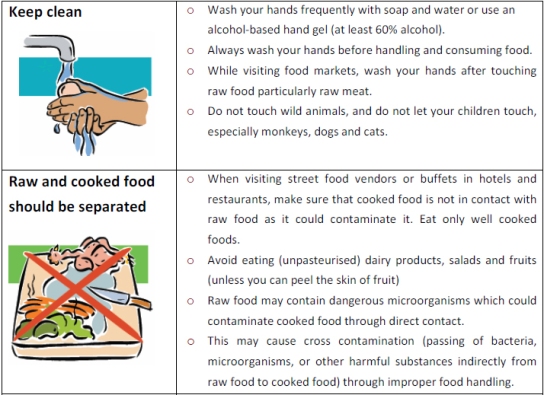Blog Archives
A-Z health information for smart travelers
Malaysians are traveling overseas in ever- increasing numbers. It is important to prepare before you leave (whatever your age or destination) and stay in good health while traveling can help you to have a happy and enjoyable trip.
Immunisations
- Immunisation is ONE OF THE BEST FORMS OF PROTECTION for all travelers.
- You need to make sure that you receive all compulsory vaccination before your trip.
- If possible, set an appointment with doctors 4 to 6 weeks before your trip.
- Most vaccines take time to become effective in your body and some vaccines must be given in a series over a period of days or sometimes weeks.
- If it is less than 4 weeks before you leave, you should still see your doctor. You might still benefit from shots or medications and other information about how to protect yourself from illness and injury while traveling.
Prevention of Foodborne Diseases: Five Keys to Safer Food
Things you should bring during traveling
- Insect repellent containing 25-50% DEET
- Over-the-counter anti-diarrhoeal medicine
- Alcohol-based hand gel (with at least 60% alcohol)
- Sun block that offers at least SPF15
- Your prescription medications in their original containers (including a copy of the prescription)
- Your travel health kit should remain with you at all times, including in your carry-on baggage.
The voyage
Traveling by Air
Low level of oxygen level within the aircraft, dehydration from low humidity and crossing time zone may cause fatigue.
- To reduce jetlag, drink plenty of water, avoid alcohol, rest on the flight and avoid a hectic schedule on arrival.
- Minimize foot swelling and increase circulation in the legs by moving your feet and toes around while seated.
- When taking off or landing, chewing gum or sucking on sweets may reduce ear discomfort as the jaw action helps to equalize middle ear pressure.
Traveling by bus, train or ship
To reduce or minimize motion sickness from this journey
- Take anti-motion sickness drugs, such as dimenhydrinate or promethazine, before the journey.
- Opening the window for ventilation and avoiding smoky environments.
- Avoid reading in the cabin.
- Sitting near the front of the vehicle & looking ahead.
What to do if you get diarrhoea?
- Most diarrhoeal attacks are self-limited and clear up in a few days.
- Diarrhoea may be accompanied by nausea, vomiting and/or fever.
- The important thing is to avoid becoming dehydrated.
- Ensure that you always drink sufficient amounts of fluids (especially children).
- If you are restless or irritable, or shows signs of strong thirst, or has sunken eyes, or dry skin with reduced elasticity, dehydration is already progressing and immediate medical attention should be sought.
- If your bowel movements is frequent, very watery or contain blood, or last beyond 3 days you should seek medical help.
- As soon as diarrhoea starts, drink more fluids, such as Oral Rehydration Salt (ORS)* solution, boiled, treated or bottled water, diluted (weak) tea, soups or other safe fluids (bottled or can drink).
- Avoid any drinks that tend to remove more water from the body, including coffee, overly sweetened drinks, some medicinal teas and alcohol.
*If ORS are not available










